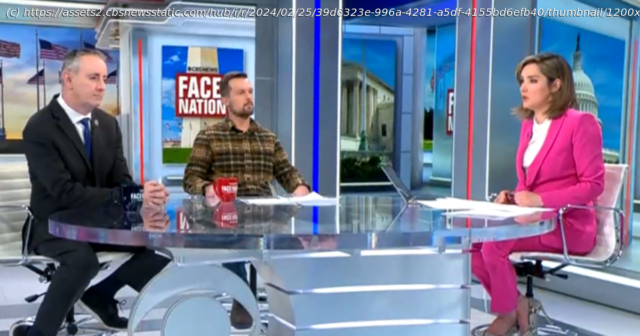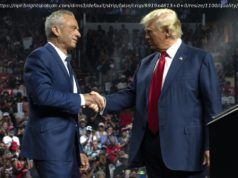On this « Face the Nation » broadcast, Israeli Prime Minister Benjamin Netanyahu and U.S. Rep. Debbie Dingell join Margaret Brennan.
On this « Face the Nation » broadcast, moderated by Margaret Brennan:
Benjamin Netanyahu, Prime Minister of Israel
U.S. Rep. Debbie Dingell, Democat of Michigan
U.S. Reps. Brian Fitzpatrick, Republican of Pennsylvania, and Jared Golden, Democrat of Maine
Oksana Markarova, Ukrainian ambassador to the U.S.
Fiona Hill, former White House Russia expert
Click to browse full transcripts of « Face the Nation. »
MARGARET BRENNAN: I’m Margaret Brennan in Washington.
And this week on Face the Nation: Donald Trump trounces Nikki Haley in South Carolina, and an interview with Israeli Prime Minister Benjamin Netanyahu.
The former president played for the cameras and the conservatives at a Washington gathering before polls closed yesterday, sharpening his latest campaign line, in which he likened himself to the late Alexei Navalny.
(Begin VT)
DONALD TRUMP (Former President of the United States (R) and Current U.S. Presidential Candidate): I stand before you today not only as your past and hopefully future president, but as a proud political dissident. I am a dissident.
(End VT)
MARGARET BRENNAN: Far-fetched as that comparison may be, consider this: his attempt to say that black voters were flocking to him because they related to the criminal charges against him.
(Begin VT)
FORMER PRESIDENT DONALD TRUMP: The mug shot. We have all seen the mug shot. And you know who embraced it more than anybody else? The black population. It’s incredible.
(End VT)
MARGARET BRENNAN: The Biden campaign called the remarks insulting, moronic and racist.
Former South Carolina Governor Nikki Haley cited the comments as another reason why she’s staying in the race.
(Begin VT)
NIKKI HALEY (R-Presidential Candidate): I don’t believe Donald Trump can beat Joe Biden. Nearly every day, Trump drives people away.
(End VT)
MARGARET BRENNAN: Our Robert Costa will be here with political analysis and news about Nikki Haley’s next steps.
Then, on to the international challenges sparking political turmoil here at home. Will backlash over President Biden’s support of Israel’s war in Gaza hurt him in Tuesday’s Michigan primary? We will talk to a key Democrat, Congresswoman Debbie Dingell.
And as year three of Russia’s war in Ukraine begins, we will look at a new push in the House for a vote on critical foreign aid to arm the Ukrainians.
We will cover it all just ahead on Face the Nation.
Good morning, and welcome to Face the Nation.
Yesterday’s South Carolina Republican primary turned out as expected, with a big win for Donald Trump. Last night, in Charleston, former Governor and U.N. Ambassador Nikki Haley put her best spin on the result.
(Begin VT)
NIKKI HALEY: I’m going to count it. I know 40 percent is not 50 percent.
(LAUGHTER)
NIKKI HALEY: But I also know 40 percent is not some tiny group.
(End VT)
MARGARET BRENNAN: As for the former president, his Friday night remarks at the Black Conservative Federation gala in Columbia, South Carolina, continued to overshadow his victory.
(Begin VT)
FORMER PRESIDENT DONALD TRUMP: Black conservatives understand better than most that some of the greatest evils in our nation’s history have come from corrupt systems that try to target and subjugate others to deny them their freedom and to deny them their rights.
You understand that. I think that’s why the black people are so much on my side now, because they see what’s happening to me happens to them. These lights are so bright in my eyes that I can’t see too many people out there. But I can only see the black ones. I can’t see any white ones, you see?
(LAUGHTER)
FORMER PRESIDENT DONALD TRUMP: That’s how far I have come.
(CHEERING AND APPLAUSE)
(End VT)
MARGARET BRENNAN: We begin with CBS News chief election and campaign correspondent Robert Costa, who joins us from Charleston.
Bob, this was an open primary in South Carolina, but just 3 percent of voters were black. Do Donald Trump’s remarks about black Americans give the party any pause here?
ROBERT COSTA: It’s giving Nikki Haley a road ahead at this point, Margaret.
She and her campaign believe there are many traditional Republicans across the country who are fed up, not only with former President Trump’s legal problems, but his incendiary comments on race. And they believe that they – – that could ostracize key voters across the country come November. That’s why she’s staying in right now, going to Michigan this week for that primary, staying in through Super Tuesday.
But there is real worry that, as Trump takes over the party and the Republican National Committee, there’s no reckoning about how he’s handling issues like race and immigration.
MARGARET BRENNAN: How long can Nikki Haley stay in the race?
ROBERT COSTA: As long as there’s money.
I have been talking to donors over the past 12 hours, and they say they’re going to keep pouring money into her campaign and into her super PAC. But, at the same time, they know that Super Tuesday come early March, that’s going to be a real crossroads for her.
Going past Super Tuesday going to be very difficult in terms of organization and fund-raising, and she has told reporters in recent days that she’s not thinking beyond that at this point.
MARGARET BRENNAN: Day to day.
All right, Robert Costa, thank you.
We turn now to the crisis in the Middle East and the war between Israel and Hamas.
Joining us from Tel Aviv is Israeli Prime Minister Benjamin Netanyahu.
Welcome back to Face the Nation, sir.
BENJAMIN NETANYAHU (Israeli Prime Minister): Thank you. Good to be with you.
MARGARET BRENNAN: Mr. Prime Minister, the U.S. is working on a hostage deal that President Biden has said would bring with it at least six weeks of calm.
The intelligence chiefs met on Friday. Are we close to a deal?
PRIME MINISTER BENJAMIN NETANYAHU: Well, I’m not sure the exact duration, but I can tell you that we’re all working on it. We want it. I want it, because we want to liberate the remaining hostages.
We’ve already brought half of them back. And I appreciate the effort, the combined effort of Israel, the United States, to bring back the remaining hostages. I can’t tell you if we’ll have it. But if Hamas goes down from its delusional claims and goes down – can bring them down to earth, then we’ll have the progress that we all want.
MARGARET BRENNAN: What specifically is holding up the deal at this point?
Reportedly, this would have 30 to 40 hostages, women, elderly, wounded, released in exchange for a few hundred Palestinian prisoners being released.
PRIME MINISTER BENJAMIN NETANYAHU: Hamas started out with just crazy demands.
MARGARET BRENNAN: Mm-hmm.
PRIME MINISTER BENJAMIN NETANYAHU: And it’s – it’s too soon to say if they’re – if they’ve abandoned them.
But if they – they do abandon them and get into what you call the – the ballpark – they’re not even in the city. They’re on another planet. But if they come down to a reasonable situation, then, yes, we’ll have a hostage deal. I hope so.
MARGARET BRENNAN: There are at least six U.S. citizens among those being held by Hamas. For you, is the return of living hostages necessary and essential for you to declare victory in this war?
PRIME MINISTER BENJAMIN NETANYAHU: I have set three war goals. The first is to release the hostages. The second is to destroy Hamas. And the third is to ensure that Gaza does not pose a threat to Israel in the future.
And, obviously, the three are intertwined. They – they’re achieved basically by our very effective and often heroic military operation and also by tough negotiations. We’re combining the two. And I hope it – it yields a result.
But understand that, unless we have total victory, we can’t have peace. We can’t leave Hamas in place. We can’t leave a quarter of Hamas battalions in Rafah and say, well, that’s – that’s fine.
MARGARET BRENNAN: On the issue of the hostages, as you know, time is of the essence here.
So, if this deal happens, and there are six weeks of calm that go with it, does that provide an opening to end this war? Or will you still go into Southern Gaza, into Rafah regardless?
PRIME MINISTER BENJAMIN NETANYAHU: Yes, well, victory is within reach. And you can’t have victory until you eliminate Hamas.
MARGARET BRENNAN: How within reach?
PRIME MINISTER BENJAMIN NETANYAHU: Hamas is a terrorist organization that – yes.
Once we begin the Rafah operation, the intense phase of the fighting is weeks away from completion, not months, weeks away from completion. And that is – we’ve already destroyed 18 of the 24 Hamas terrorist battalions. So, we – we have a – and four of them are concentrated in the Rafah.
We can’t leave the last Hamas stronghold un – without taking care of it. Obviously, we have to do it. But understand too that I have asked the army to submit to me a double plan, first to evacuate, to enable the evacuation of the Palestinian civilians in Gaza, and, obviously, second, to destroy the remaining Hamas battalions.
That gets us a real, real distance towards the completion of our victory. And that – we’re not going to give it up. If we have a deal, it’ll be delayed somewhat. But it’ll happen. If we don’t have a deal, we’ll do it anyway. It has to be done, because total victory is our goal, and total victory is within reach, not months away, weeks away, once we begin the operation.
MARGARET BRENNAN: Well, the White House says they need to see a credible and executable plan to protect civilians and the 1.4 million people who are sheltering in Southern Gaza.
This morning, the White House says they still have not seen such a plan, and no major military operation should proceed without it. Have you approved the plans that you’ve said you’ve asked for?
PRIME MINISTER BENJAMIN NETANYAHU: Actually, I’m – Margaret, I’m going from here to a meeting with the general staff, where they’re going to show me this dual plan…
MARGARET BRENNAN: OK.
PRIME MINISTER BENJAMIN NETANYAHU: … a plan to evacuate and a plan to dismantle those remaining battalions.
So, yes, we – by the way, we agree on this. I mean, we don’t have to be prodded. It’s – we’re on the same page with the U.S. on this, because that’s how we do it. The reason you have that population in Rafah is because we actually cleared them away from the other places, the zones, combat zones that we had. That’s why they’re there.
So now there’s room for them to go north of Rafah to the places that we’ve already finished fighting in.
MARGARET BRENNAN: That’s where you’re going to move…
PRIME MINISTER BENJAMIN NETANYAHU: And that’s basically what we’re going to do.
MARGARET BRENNAN: That’s the plan?
PRIME MINISTER BENJAMIN NETANYAHU: Yes.
MARGARET BRENNAN: To move 1.4 million people into Northern Gaza? Can you guarantee that the IDF will not push…
PRIME MINISTER BENJAMIN NETANYAHU: I didn’t say Northern Gaza. I said…
MARGARET BRENNAN: … will not – sorry. Go ahead.
PRIME MINISTER BENJAMIN NETANYAHU: I said north of Rafah.
MARGARET BRENNAN: OK.
PRIME MINISTER BENJAMIN NETANYAHU: I said north of Rafah. In the northern part of the Gaza Strip, we still have fighting going on.
MARGARET BRENNAN: Right.
PRIME MINISTER BENJAMIN NETANYAHU: But we – we are – that is important.
It’s important to understand, moving civilians out of an area that is going to be a combat zone is not a bad thing. It’s a good thing.
MARGARET BRENNAN: Sure.
PRIME MINISTER BENJAMIN NETANYAHU: And that’s what Israel is going to do.
MARGARET BRENNAN: Un – understood.
But the IDF, can you guarantee that they won’t push Palestinians out of Gaza and into Egypt? As you know, Egyptian officials have said, if you do that, you are putting at risk 46 years of peace.
PRIME MINISTER BENJAMIN NETANYAHU: Look, I – I think that the Egyptians know very well that that’s not our purpose. And that won’t be the result. And we’re coordinating.
We’re talking to the Egyptians all the time. So that’s not – I don’t think that’s an issue. The peace between Israel and Egypt has served the interests of both countries, and will continue to serve the interests of both countries. I don’t think it’s in – in any danger.
MARGARET BRENNAN: You said that victory is within reach.
PRIME MINISTER BENJAMIN NETANYAHU: Yes.
MARGARET BRENNAN: But U.S. Intel says the IDF has only destroyed 30 percent of Hamas leadership, and that the amount of – of tunnels that Hamas uses have really only been tiny in terms of what has been destroyed by the IDF.
There is growing distrust…
PRIME MINISTER BENJAMIN NETANYAHU: Well…
MARGARET BRENNAN: … of you personally, sir – you know this – in the U.S. Congress and within the Biden White House.
When your closest ally is telling you things like this and telling you that you need to reconsider a strategy, isn’t it worth considering?
PRIME MINISTER BENJAMIN NETANYAHU: Look, I – I think that the U.S. is – agrees with us on the goal of destroying Hamas…
MARGARET BRENNAN: Yes.
PRIME MINISTER BENJAMIN NETANYAHU: … and on the goal of releasing the hostages.
The decisions of how to do that are left with us and with me and the elected Cabinet of Israel. And we’re doing that. A lot of things that the U – that we were told by the best of friends initially turned out not to be true.
They said you can’t enter the – the ground war without having enormous complications. They said you cannot fight – you can’t enter Gaza City. You can’t go into the tunnels. It will be a terrible bloodbath. All of that turned out to be not true.
Our soldiers are in the tunnel network. We don’t have to take apart hundreds of kilometers of tunnels. We are taking apart the missile production factories that are underground, the command-and-control headquarters, the computers that are there, the money that is there, the weapons that are there, and the ammos that – that is there.
We’re doing that methodically. So, we’re – we’re doing the war – you can’t substitute for the Israeli military command. And we’re doing it very responsibly. The – John Spencer, who’s the head of urban warfare at West Point…
MARGARET BRENNAN: Yes.
PRIME MINISTER BENJAMIN NETANYAHU: … says that no other army has gone to the lengths that Israel’s army has gone to clear civilians out of harm’s way, even though Hamas…
MARGARET BRENNAN: Sure…
PRIME MINISTER BENJAMIN NETANYAHU: … is doing everything to keep them in harm’s way.
We respect our American friends.
MARGARET BRENNAN: Sure, but the former head of Central Command was on this program just a few weeks ago and said, basically, you have not articulated any specific endgame here.
So – but, putting that aside, I want to come back to a few different things you said.
PRIME MINISTER BENJAMIN NETANYAHU: No, well, wait a minute. Margaret, Margaret, hold on. You – you lob these – these grenades at me, and you keep on moving.
Well, first of all, you say, there’s no confidence in me. Well, the Israeli public has confidence in me. Last week, Knesset voted overwhelmingly…
MARGARET BRENNAN: There were massive protests throughout Israel yesterday.
PRIME MINISTER BENJAMIN NETANYAHU: Of course we have protests. We – we have protests. Israel is a democracy. We’ve had protests for 30 years.
But the Israeli people are united as never before. Last week, they voted 99-9 in the Knesset for my proposal that says that the way – that we have to do two things. We have to win the war, have total victory, but also not have an international dictate of a Palestinian state on – shoved down our throats that would endanger Israel.
The people are overwhelmingly united on this. When is the last time we had 99 votes in the Knesset?
MARGARET BRENNAN: Yes.
PRIME MINISTER BENJAMIN NETANYAHU: I will tell you, 30 years ago.
MARGARET BRENNAN: Yes.
PRIME MINISTER BENJAMIN NETANYAHU: So, the people are united. The policy is right. The people support it. And I intend to take it to completion, because that’s what we have. We can’t compromise with total victory, because I will tell you, we can’t win the peace if we don’t win the war.
(CROSSTALK)
PRIME MINISTER BENJAMIN NETANYAHU: And we will win this war.
MARGARET BRENNAN: One of the members of the Knesset, the former Israeli Prime Minister Yair Lapid said he asked the Americans about what you just said about a unilateral declaration of recognition of a Palestinian state, and he said: « You invented a threat that doesn’t exist. There is not one official in the world that suggested unilateral recognition of the Palestinians. »
So, putting that aside, I want to…
PRIME MINISTER BENJAMIN NETANYAHU: Yes, actually, the foreign secretary of Britain just spoke about it.
There have been many…
MARGARET BRENNAN: Well, this was the U.S.
PRIME MINISTER BENJAMIN NETANYAHU: I hope that’s true.
MARGARET BRENNAN: OK.
PRIME MINISTER BENJAMIN NETANYAHU: We’ve heard – we’ve heard a lot of briefings coming from – from the U.S. to that effect. So, I hope it’s true.
MARGARET BRENNAN: Yes.
PRIME MINISTER BENJAMIN NETANYAHU: And, if it’s true, then – then that will reinforce the decision made by the government – by the people of Israel, through their elected representative.
And, by the way, if people try to foist it on us, it will be a terrible mistake…
MARGARET BRENNAN: Yes.






